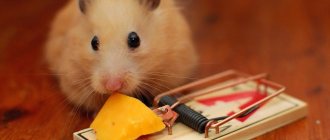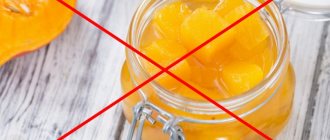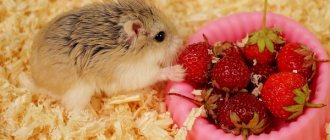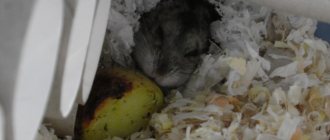When getting a hamster as a pet, you should pay close attention to its diet. You should find out which foods are suitable for a rodent, and which ones are not recommended to be added to the diet. This will help keep the animal healthy and cheerful. Let's figure out whether hamsters can have milk and dairy products. Please note that feeding recommendations may vary depending on the breed of your pet.
What are the benefits of milk
What do we even know about him? White, tasty, healthy. If you drink a lot of cold things, your throat will hurt. In addition, this natural product contains:
- calcium;
- magnesium;
- phosphorus;
- other elements for the correct and harmonious development of a young body.
There is no doubt about the benefits of this product for humans, but does this apply to hamsters? Before answering this question, I would like to cite one interesting fact :
Among all mammals, only humans, as adults, are able to drink milk without harm to their health thanks to a mutation that occurred several thousand years ago.
I very much suspect that now all cat owners will snort indignantly and will be partly right, but only partly. Cats, no matter how strange it may sound, should not be fed natural milk all the time either. Well, they don’t produce lactose to digest milk sugar. If you don’t believe me, read the information on specialized cat websites.
Composition of milk
The only purpose of milk is to nourish the young of its species. In other cases it is not produced or used. Among adults, milk exists only in the human diet. Milk from a goat, cow or sheep is rich in nutrients:
- fats;
- proteins and amino acids;
- microelements;
- microflora;
However, research shows that dairy products often cause digestive disorders, allergic reactions, and intolerance to individual components in the composition. Despite the fact that milk has been in the diet for thousands of years, and the body is adapted to it, the benefits of the drink remain controversial.
So should you give your hamster milk or not?
The question is ambiguous. This is not contraindicated for most breeds, but at the same time, it is not recommended for anyone. Exception: rare cases when the pet’s body needs certain nutrients.
In any case, this product can be introduced into a rodent’s diet only as prescribed by a veterinarian in the following cases:
- During certain illnesses, when the animal’s body is severely weakened.
- To maintain the health of a pregnant or lactating female, as well as for babies who do not have access to breast milk.
Separately, it is worth mentioning the two most popular breeds - Syrians and Djungarians. So, Dzungarians are known for their weak immunity. Even a teaspoon of milk will easily knock them down; it is completely contraindicated for them. If you don’t want to turn your pet’s life into sheer malaise and nausea, refrain from treating him to any fermented milk products. Syrians are distinguished by stronger immunity, capable of withstanding most of the problems that would have killed the Djungarian long ago, but milk is also not recommended for them, like all rodents in general.
Which milk should I give to whom?
Newborn hamsters drink their mother's milk, which gives them the necessary strength and energy for proper growth and development. At a certain age, the need to feed mother's milk disappears. An adult hamster that does not suffer from diseases does not need to add milk to its diet. A store-bought product undergoes special processing and does not contain a large amount of useful substances.
Giving milk to hamsters is recommended in the following cases:
- If the hamster is pregnant or nursing babies. During this period, the small body needs additional support.
- If the baby is left without a mother and needs to be fed. In this case, a special mixture is suitable. A specialist will tell you which mixture is best to use.
- The rodent suffered a serious illness. Milk is given as prescribed by a doctor in certain doses.
In these cases, it is recommended to feed the animals with low-fat milk - less than 1.5% fat content. Cow's milk is preferable. It is less fatty than goat. The rodent's body is sensitive to fatty foods. Excessive load on the liver negatively affects the general condition and health of the pet. Lethargy and fatigue appear.
Before feeding your hamster milk, you should boil the liquid and cool it to room temperature. Heat treatment disinfects the milk and helps prevent infection of the creature. Portion sizes and diet are discussed with the veterinarian.
Is it possible to give a hamster kefir?
What is useful for a person is not always useful for his pet. Remember this rule. You will encounter it very often. Kefir, in any quantity, is harmful to the hamster. Consumption of kefir always leads to disruption of the gastrointestinal tract in rodents. At best, they face:
- diarrhea;
- constipation;
- weakened immunity;
- general lethargy.
To avoid all this, it is important to remember one rule - no kefir for rodents in any doses.
Products hazardous to health
The heavy substances that make up many dairy products are poorly absorbed in the rodent's body. He becomes inactive, lethargic, sleepy. The gastrointestinal tract, liver, heart and blood vessels suffer.
It is better not to give the animal:
- Sour cream. This product has a high fat content and is poorly absorbed by the body.
- Kefir. Strikes the liver of a rodent. Poor quality food can cause constipation, and stale food can cause diarrhea.
- Yogurt. The high content of fats and flavoring additives is dangerous for the health of the hamster.
- Butter. It has a high fat content and is poorly absorbed by the body.
- Milk porridge. Large amounts of milk and cooked cereals harm the baby’s liver.
Is it possible to feed cottage cheese, sour cream or yogurt?
Gradually, the article pushes us to the conclusion that fermented milk products are not recommended for inclusion in the diet of domestic rodents in any form. The only exception is low-fat cottage cheese without sugar - and even then, with strict restrictions and as prescribed by a veterinarian. Also, hamsters cannot have sour cream because of its fat content - it never contains less than 10% fat. Yogurts, even low-fat ones, should not be given either. They are also full of sugar, especially in store-bought yoghurts, which have various flavorings.
What other dairy products should you feed?
Occasionally, you can add low-fat cheese without impurities and salt to your pet’s diet. Check with your doctor before giving your pet a new treat. It is not recommended to give other dairy or fermented milk products. You should not cook porridge with milk, as the digestion process will be difficult. The animal’s body is not adapted to such food.
Before adding new products to your pet’s diet, carefully read the ingredients of the product and consult with your veterinarian. Not all foods that are healthy for humans can be given to hamsters. When making changes to your animal's diet, monitor its well-being. This will help prevent the negative consequences of poor nutrition and understand what is not suitable for your pet.
Cheese
It is also not recommended to feed your hamster cheese, since the hard varieties are made with salt and spices, while the soft ones have a viscous consistency and can stick in the pet’s cheek pouches, which in turn can lead to serious consequences. Read more about whether hamsters can eat cheese here.
For your pet to live a long and happy life, you need to feed it properly. Therefore, you should not feed your rodent everything, including dairy products. We hope that you now know whether hamsters can have milk, cottage cheese, yogurt, kefir and cheese, as well as when and how often you can feed your pet dairy products.
Did you like the article? Share with friends: [supsystic-social-sharing id=”1"]
- Related Posts
- Can hamsters eat cucumbers?
- Can hamsters have melon?
- Can hamsters have a pear?
« Previous entry
Proper pet care
When planning to purchase individuals of the hamster family, you should first think about whether following the rules of care, which include such points as:
- washing the cage, feeder, drinking bowl without disturbing the usual arrangement of objects in the pet’s home on a weekly basis;
- changing bedding, cleaning bins of spoiled food weekly;
- daily toilet care;
- creating comfortable, stable conditions without disturbing them.
It is extremely important not to disturb the animal’s way of life, determined by it after moving into the cage. Otherwise, the animal receives too much nervous stress, experiences stress and dies a sudden death. It is not recommended to move the rodent’s home from place to place, or to let it out of its designated living space. To satisfy your baby's physical activity, it is enough to install a running wheel.
What not to give
Although Syrian hamsters are omnivores, there are many products whose introduction into the menu will have a bad effect on the health of the animal and can even cause death. To avoid such a fate, you need to know exactly which foods are prohibited from being included in your diet:
- Sugar, salt, spices, herbs, artificial food additives.
- Sweets, chocolate, juices.
- Nuts, seeds of any fruit.
- Sour plants.
- Citrus and exotic fruits.
- Coniferous tree branches.
- Dairy products, except kefir and cottage cheese.
- Fresh baked goods.
- Canned food, smoked meats, preserves.
- Food intended for other animals or birds.
- Chestnuts, almonds, mushrooms.
You cannot catch insects on your own to feed your pet, or allow him to get his own food on the street.
If you feed your Syrian hamster correctly, excluding prohibited foods, the rodent will be active, cheerful and healthy. It is important to provide your pet with a balanced diet, since its well-being and life expectancy depend on it.
Catering
Considering that domesticated individuals are quite active animals, their diet should be balanced. When setting out to find out whether it is possible to give them milk, the owners come across divergent opinions. Some believe that milk is healthy and therefore must be consumed by animals, while others insist on the need to eliminate it from the diet completely.
A properly organized diet allows children to fully develop, meets their needs for vitamins and minerals, and strengthens physical health. The main products serving as pet food are:
- dry food - sold in pet stores, veterinary pharmacies, rich in all kinds of grains and additional nutrients. When it is eaten, the process of grinding the teeth is carried out;
- seeds, nuts – served infrequently, in small quantities;
- water is required for individuals feeding on dry food;
- vegetables – served peeled, not boiled in advance;
- fruits - it is preferable to cut off the peel and serve pears, apples, raspberries. Citrus fruits are prohibited.
When organizing the animal’s nutrition, it is necessary to take into account its daily food requirement. Feeding is carried out twice a day, the bulk of food is served in the evening, since during the day they mainly sleep. In the morning, leftover food is removed, especially for products that quickly deteriorate without certain storage conditions. Still, the question of whether hamsters can eat dairy products remains open.
Vitamins, mineral supplements and treats
For the proper development and full functioning of the body of Syrian hamsters, it is necessary not only to feed them in a balanced manner, but also to provide them with special fortified preparations. They are available in solid and liquid form and are mixed into the animal’s drink or food.
A mineral stone is also placed in the pet's cage. It will not only help sharpen the incisors, but also enrich the body with essential substances. Pregnant females are given a chalk stone, which can have a fruity or herbal flavor and will provide the expectant mother with calcium and other trace elements.
As treats for your Syrian hamster, you can eat rose petals, unbuttered and salt-free popcorn, dried fruits, cereal sticks and fruit chips.
What do hamsters eat in the wild?
The diet of the Djungarian hamster, which forages in the Asian steppes and deserts, is quite varied. It includes both succulent and dry food. Wild Djungarian hamsters have to find their own food, because they do not have caring owners who are ready to take them under their care. Rodents usually try to stay away from people, but sometimes they raid farmland. Thus, wild dwarfs feed on:
- grains of cereal plants. These include wheat, oats, corn, barley, rye and many others. In summer and autumn, when the ears lie down, the Djungarian hamster stores grains;
- sunflower seeds;
- vegetables, which include zucchini, eggplant, cucumbers, etc.;
- carrion. Wild dwarfs love to eat fruits falling from trees. They feast on apples, peaches, and rose hips. Their diet also includes berries - grapes, currants, blackberries, etc.;
- grass. Juicy herbs of various types are an integral part of hamsters’ diet;
- small invertebrates. Sometimes fluffies feast on snails and slugs. This food has a lot of protein. Moreover, Khoma is not embarrassed when he sees a mollusk shell; he easily chews it.
Homemade food for hamsters should be similar to what they eat in the wild.
How to feed a Djungarian hamster
How many times a day should you feed the animal? Djungarians are nocturnal (like other hamsters), so the main meal should be in the evening. You can feed food only once a day, but it wouldn’t be a mistake to feed it twice (in this case, let’s eat 70% of the daily amount in the evening, and 30% in the morning). This is not done for gorging before bed, but so that during the day, when the animal periodically wakes up, it has something to eat - the dwarf has a very fast metabolism (an eternally hungry hamster).
An adult Djungarian hamster only needs a tablespoon of food per day (with a small heap). Even if the food quickly disappears from the bowl, this is not a reason to feed more: most likely, your pet took everything that it didn’t eat into the pantry in order to “hamster” it later. It is his instinct to stock up.
Add more rash or I’ll bite your nose off!
Don't forget to promptly remove leftover perishable foods, otherwise they will begin to rot in the pantry.
Place the bowl itself in the house as far as possible from the toilet (the hamster will determine where he will have a toilet himself, so it will not be possible to designate places for feeding and relief in advance).
For owners of Syrians and Dzungarians
Regardless of the breed, hamsters have the same diet. Both Syrians and Dzungarians can be offered low-fat cottage cheese and cheese a couple of times a month.
Milk contains proteins - casein and albumin, which are dangerous to the health of little jungarians. For larger Syrians, it can be given in small portions, separately from other foods.
If you want to treat a sick pet with dairy cuisine, consult a specialist. Such products, if used incorrectly, can worsen the animal’s illness.
Basic rules for feeding hamsters
If you do not know how to feed a Djungarian hamster at home, we recommend that you familiarize yourself with the following recommendations:
- Food for your pet should be balanced.
- It should contain only natural products.
- The composition of the food should resemble the diet of wild jungarians.
- You should feed your pet only fresh food.
- Do not put overripe fruits and vegetables in your hamster's bowl.
- When feeding fruit, remove the pit.
- You cannot feed dungarian hamsters with confectionery and other “delicacies” from the human table!
- Promptly remove uneaten remains of succulent feed.
These tips will help your home eat properly and prevent food poisoning.
Cottage cheese
Whether hamsters can have cottage cheese is also a concern for owners of furry pets. Cottage cheese is a protein product that is easily and quickly absorbed by the body. But it should not be abused either.
You can offer your rodent a small amount of this complementary food, following these recommendations:
- To feed your pets, use a low-fat product;
- Feed cottage cheese no more than once a week, alternating with other protein supplements - boiled meat and boiled eggs;
- Buy only fresh dairy products and only from trusted sellers.
Feeding stale cottage cheese or other dairy products can lead to severe poisoning, so check them carefully.
If you follow these recommendations, your pet will receive all the necessary nutrients from the cottage cheese, and the gastrointestinal tract will not be affected.
Yogurt
But can hamsters have yogurt? If you want to offer your pet yogurt, then choose a low-fat (no more than 1%) product without additives and sugar or bifilin. It's best if you make yogurt yourself and feed it to your rodent. Only this product should not be fed to the hamster often; 3-4 times a month is enough.
To make yogurt tastier, use fruits from the approved list, such as apples. Cut a small piece of fruit or mash it and mix it with a teaspoon of natural yogurt. Your hamster's treat is ready!
Rules and features of feeding
General recommendations that should be followed when developing a daily menu for the Syrian hamster:
- Feeding must be divided into 2 stages. In the morning, give less food, and in the evening, when the animal is more active, offer most of the daily requirement.
- It is important to carefully check all secluded places in the cage to identify hidden supplies and immediately throw away spoiled food.
- Food should be both healthy and varied. Poor nutrition can cause allergic reactions.
- When choosing a grain mixture, you should always check the expiration date indicated on the packaging.
- A new product should be introduced into the diet gradually, followed by an increase in dose in the absence of side effects.
- The daily norm for a Syrian hamster depends on the age, size, individual characteristics of the pet, as well as the air temperature in the room where the cage is installed.
- Make sure that all the food offered to the hamster is eaten within 5-7 minutes. It is better to remove the remaining food - the animal will begin to scatter the food and mix it with sawdust. As a result, an undetected piece of vegetable or other perishable product may rot and pose a danger to the animal.
The weight of an adult hamster should not exceed 200 g or be below 100 g. If the animal has gained excess weight, it must be put on a diet and make sure that it has the opportunity to exercise.
You can give milk if you are careful
As a rule, animals like milk. But, like other dairy products, it should be given rarely. They give it as a delicacy, maybe once a week or a little less often. Milk can and should be given to a hamster after certain illnesses for adaptation. If the hamster is pregnant, then it needs to be fed milk more often. Because the body gives off a lot of energy and requires constant renewal. You can also continue to give while feeding the offspring. When the rodent has become a mother, you can give 4-5 grams of dissolved milk powder in the first 3 weeks. Powdered milk is easily digested by hamsters, including young ones. Hamsters can also eat cheese if it is not salty.
Can hamsters have milk? You can, but it’s better to feed him cottage cheese. Whole milk, if given, is given very rarely. If you still want to pamper your pet with milk, then adhere to the following rules:
- Do not neglect the fact that a hamster can drink milk. It does not need to be given often. Preferably once a week or less.
- Before giving this dairy product to your rodent, you need to boil it for better absorption. This way it will become more secure.
- Don't give goat's milk. Its fat content is even higher than that of a similar product from a cow.
Article on the topic: Can hamsters eat a pear (Syrian, Dzungarian and other breeds)











